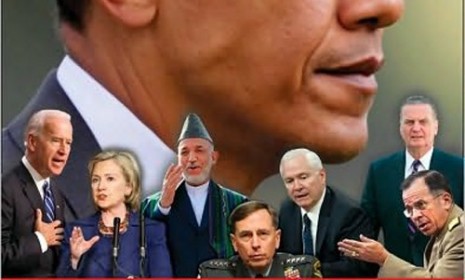Bob Woodward's 'Obama's Wars': 5 heated debates
Woodward's inside look at Obama's Afghanistan War policy has only just hit bookstores, but the fighting is already well underway

A free daily email with the biggest news stories of the day – and the best features from TheWeek.com
You are now subscribed
Your newsletter sign-up was successful
Obama's Wars, Bob Woodward's book about the White House's battle over Afghan war policy, only hit the shelves on Sept. 27 — but it has already sparked several intense debates among pundits and experts:
1. Is the Afghan War winnable, or another Vietnam?
Woodward's book doesn't just detail a split between Obama and his generals, says The Washington Post in an editorial. It also paints a picture of a disheartening divide between relatively optimistic Pentagon chiefs and several key civilian and military officials who are convinced that Obama's war strategy "is doomed to fail." The pessimists include Vice President Biden, who as late as this summer was reportedly "more convinced than ever that Afghanistan was a version of Vietnam." Worse, "some suspect the president shares their views." Maybe, says Fred Kaplan in Slate, but Woodward shows that Obama is "also convinced that the stakes are too high to warrant pulling out" of what may, in fact, be a "futile" war. Woodward, "wittingly or not," also "points toward a possible way out of the quagmire" — beat the Taliban just enough to get them to cut a deal with the Afghan government. As both Obama and Petraeus have said many times, "the war will end with a settlement, not a victory or surrender."
The Week
Escape your echo chamber. Get the facts behind the news, plus analysis from multiple perspectives.

Sign up for The Week's Free Newsletters
From our morning news briefing to a weekly Good News Newsletter, get the best of The Week delivered directly to your inbox.
From our morning news briefing to a weekly Good News Newsletter, get the best of The Week delivered directly to your inbox.
2. Can the U.S. rein in Pakistan?
The book focuses on Obama's Afghan deliberations, says Josh Rogin in Foreign Policy, but it also reveals that "the White House considers its war effort much more dependent on the success and survival of Pakistan's civilian government than was previously known." Woodward reports the series of carrots and sticks the Obama team offers Pakistan's civilian and military leaders to get them to fight the Taliban and Al Qaeda on their side of the porous border. One stick, raised in response to the failed Times Square car bombing, was a "retribution plan" to bomb 150 terrorist camps "in a brutal, punishing attack inside Pakistan." Whoa, "does that plan still stand?" asks Myra MacDonald in Reuters. Pakistan is a problem now, but by bombing it "Washington would end up with an even bigger security threat — a nuclear-armed country slipping out of control."
3. Did Obama "get rolled" by his generals?
The question Woodward's book ostensibly addresses is, "What is America going to do in Afghanistan, and how can it do it?" says Bryan Curtis in The Daily Beast. But the real issue is "whether Obama got rolled by the military." Obama comes across as determined to wind down the war, The Wash. Post says, repeatedly asking his military chiefs for "an exit plan that they never gave him." So Obama writes "his own war plan to spite them"? says Ed Morrissey in Hot Air. That's rich, given how much "Democrats ripped George W. Bush for supposedly not listening to his generals" in Iraq. Actually, says David Sirota in The Huffington Post, the big scandal is that the generals "quite literally usurped the policymaking powers of the President." Civilian control of the military is "one of the most basic tenets of our Constitution," and the generals ought to be fired for this gross "insubordination."
A free daily email with the biggest news stories of the day – and the best features from TheWeek.com
4. Was the president being "complacent" about another major terrorist attack?
During a conversation with Woodward in July, The Wash. Post reports, Obama said: "We can absorb a terrorist attack. We'll do everything we can to prevent it, but even a 9/11, even the biggest attack ever... we absorbed it and we are stronger." Those are "stunningly complacent words from the man responsible for stopping such a terrorist attack," says Marc Thiessen at the American Enterprise Institute. "He is effectively saying: An attack is inevitable" and would be "no big deal." Are conservatives really this dense or just sickly "obsessed with gloom-and-doom scenarios"? asks Doug Mataconis in Outside the Beltway. Of course we can "absorb" a terrorist attack, and "the same sort of 'we can take it' tough talk" was called "American optimism" when Bush used it "virtually every day he was in office."
5. Wait... the CIA has a 3,000-man "secret" army in Pakistan?
Among all the "sketchily sourced stories of interpersonal sniping within the administration," says Justin Elliott in Salon, Woodward drops some actually important news, like the revelation that the CIA funds and directs a 3,000-strong "covert army" of "elite, well-trained" Afghans that "conduct highly sensitive covert operations into Pakistan" to kill or capture Taliban and Al Qaeda fighters. That's an "explosive" finding, but hardly surprising, says Luis Martinez at ABC News. Looking at the Predator drone strikes, "it's no secret that the U. S. wants to see an end to the safe havens" across the porous Afghan-Pakistan border. These so-called Counterterrorist Pursuit Teams are classic CIA, says Spencer Ackerman in Wired. But while they solve one problem — how to fight an enemy in "politically or militarily unfeasible" territory — history is full of deadly examples "that the U.S. can't control those proxy forces" once they are trained and armed.
This article was originally published on Sept. 23, 2010. It was updated on Sept. 29.